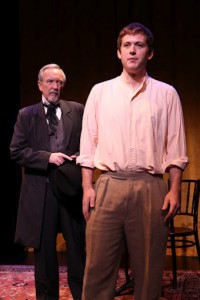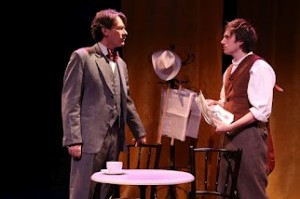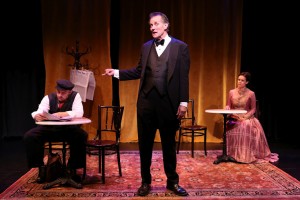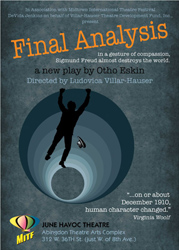HISTORICAL FIGURES FOR DUMMIES
As the audience settled in and Stephen Bradbury, who plays the waiter and also serves as a partial narrator in Otho Eskin’s new play Final Analysis, came out onto the stage dressed in full tails (lovely costumes by Jenny Green) and, with a bemused yet somewhat foreboding grin, delivered the admonitions regarding electronic devices in character, I found myself elated with anticipation. This feeling was stoked when original black-and-white film footage showing turn-of-the-20th-century Vienna was projected onto a curtain, like a little window opening into a romantic, bygone era (projection/video design by Annie Berman); I felt sure that what we were about to see would be special. The next time I felt that elation was about 90 minutes later, when I realized that what I thought was going to be an intermission was in fact the end of the show.
 The best that can be said about Mr. Eskin’s well-intentioned mess is that it has a nostalgic and almost charming naiveté. Final Analysis imagines various historical personages interacting in and around a coffee house in 1910 Vienna (adequate set by Brittany Vasta). Sigmund Freud (Gannon McHale) provides psychotherapy, dream analysis and marital advice (to the effect: a man can either be a husband or an artist; he cannot be both) to Gustav Mahler (Ezra Barnes); Stalin (Tony Naumovski), when not agonizing over a mate-in-one chess problem on his own tiny set, rants to anyone who’ll listen about the proletariat revolution and killing the ruling classes (in his black vest and worker’s cap, this Stalin looks more like Lenin); there’s Ludwig Wittgenstein (Jeremiah Reynolds), whose only interests appear to be hating women, suicide and talking about wanting to hang out with the rough boys by the river at night; and of course there’s young Hitler (he isn’t named but it’s clear who he’s supposed to be), played with intensity, if not much nuance, by Michael Goldsmith. A poor, frustrated and angry former art student, Hitler has ambitions of becoming a great artist and of changing the world through his art, while trying unsuccessfully to sell his little paintings to passersby, who inexplicably have nothing but contempt for them and for him.
The best that can be said about Mr. Eskin’s well-intentioned mess is that it has a nostalgic and almost charming naiveté. Final Analysis imagines various historical personages interacting in and around a coffee house in 1910 Vienna (adequate set by Brittany Vasta). Sigmund Freud (Gannon McHale) provides psychotherapy, dream analysis and marital advice (to the effect: a man can either be a husband or an artist; he cannot be both) to Gustav Mahler (Ezra Barnes); Stalin (Tony Naumovski), when not agonizing over a mate-in-one chess problem on his own tiny set, rants to anyone who’ll listen about the proletariat revolution and killing the ruling classes (in his black vest and worker’s cap, this Stalin looks more like Lenin); there’s Ludwig Wittgenstein (Jeremiah Reynolds), whose only interests appear to be hating women, suicide and talking about wanting to hang out with the rough boys by the river at night; and of course there’s young Hitler (he isn’t named but it’s clear who he’s supposed to be), played with intensity, if not much nuance, by Michael Goldsmith. A poor, frustrated and angry former art student, Hitler has ambitions of becoming a great artist and of changing the world through his art, while trying unsuccessfully to sell his little paintings to passersby, who inexplicably have nothing but contempt for them and for him.
 The concept of Final Analysis, directed by Ludovica Villar-Hauser, has a lot of potential. But devoid as it is of those elements that collectively make up drama (story, characters, obstacles, etc.) it ends up being merely an excuse for Mr. Eskin to put words into these historical personages’ mouths in order that they may tell us his version of what they think and feel about life, love, art, the sexes, Viennese society, anti-Semitism, and so on. This could have been amusing in and of itself, even without some grand dramatic scheme as, say, a collection of clever little vignettes. Unfortunately the thoughts expressed are inelegant, simplistic and dull, as though they were cut and pasted from some very dubious 3rd grade history book, one with big, colorful illustrations and speech bubbles.
The concept of Final Analysis, directed by Ludovica Villar-Hauser, has a lot of potential. But devoid as it is of those elements that collectively make up drama (story, characters, obstacles, etc.) it ends up being merely an excuse for Mr. Eskin to put words into these historical personages’ mouths in order that they may tell us his version of what they think and feel about life, love, art, the sexes, Viennese society, anti-Semitism, and so on. This could have been amusing in and of itself, even without some grand dramatic scheme as, say, a collection of clever little vignettes. Unfortunately the thoughts expressed are inelegant, simplistic and dull, as though they were cut and pasted from some very dubious 3rd grade history book, one with big, colorful illustrations and speech bubbles.
 According to the play, Freud, well into middle-age by 1910, is of the opinion that people are basically good and that love is what drives all men; Freud’s analysis of Mahler’s dream is not only contrary to the techniques described in The Interpretation of Dreams but the methodology sounds like some sort of Dr. Phil pop psych garbage; when Mahler and his wife Alma Maria (Elizabeth Jasicki) argue about her music—Mahler wants her to stop playing, Alma wants to keep playing—they just come right out and say what they are thinking (mirroring, incidentally, Wikipedia’s description of their marital woes). In general the writing is so obvious and heavy-handed, without subtlety or subtext, that it’s almost as though there wasn’t even an attempt made to be artistic.
According to the play, Freud, well into middle-age by 1910, is of the opinion that people are basically good and that love is what drives all men; Freud’s analysis of Mahler’s dream is not only contrary to the techniques described in The Interpretation of Dreams but the methodology sounds like some sort of Dr. Phil pop psych garbage; when Mahler and his wife Alma Maria (Elizabeth Jasicki) argue about her music—Mahler wants her to stop playing, Alma wants to keep playing—they just come right out and say what they are thinking (mirroring, incidentally, Wikipedia’s description of their marital woes). In general the writing is so obvious and heavy-handed, without subtlety or subtext, that it’s almost as though there wasn’t even an attempt made to be artistic.
 Ms. Villar-Hauser’s obtuse direction has her actors barking nearly every line, even greetings, as though they’re all just pissed off at everything all the time, though there’s no motivation for this. And her blocking is less than dynamic. In general, the performances are not well-layered and appear awkward; to be fair, the actors have very little to work with. The exceptions are Mr. Naumovski, whose obsessiveness is at least amusing; Mr. Barnes’s monologue about being Jewish, which he delivers with appropriate vexation; and Mr. Goldsmith’s maniacal tirade in the last scene.
Ms. Villar-Hauser’s obtuse direction has her actors barking nearly every line, even greetings, as though they’re all just pissed off at everything all the time, though there’s no motivation for this. And her blocking is less than dynamic. In general, the performances are not well-layered and appear awkward; to be fair, the actors have very little to work with. The exceptions are Mr. Naumovski, whose obsessiveness is at least amusing; Mr. Barnes’s monologue about being Jewish, which he delivers with appropriate vexation; and Mr. Goldsmith’s maniacal tirade in the last scene.
In the end Final Analysis feels like the sentimental daydream of a retired history teacher, unimaginative and innocuous, with ideas that are sure to be accessible to everyone.
photos by Joan Marcus
Final Analysis
Midtown International Theater Festival at June Havoc Theater in New York City
scheduled to end on August 4, 2012
for tickets, visit http://www.midtownfestival.org/

{ 1 comment… read it below or add one }
Thank you for such a truthful review. I also had high expectations and was so disappointed. The play was poorly written and utterly lacking in depth and accuracy.